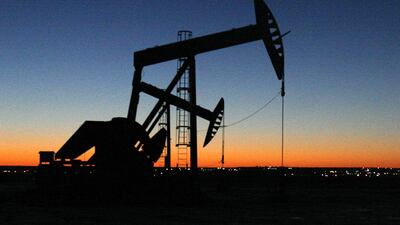Standard Chartered expects oil to rebound to more than US$100 a barrel next year amid higher global growth, led by big emerging markets such as China and India.
But even if oil prices do not bounce back, the bank says Arabian Gulf states have big enough cash reserves to get through a period of lower energy prices.
“Despite the efforts to diversify the economies of the GCC, oil prices still play a significant role, and to a greater extent higher oil prices are needed for GCC countries to continue to diversify their economies,” said Marios Maratheftis, the bank’s global head of macro economic research. “We see this move in oil prices as a short-term move. We would expect a moderate recovery next year. So our average forecast for Brent next year is at $103 per barrel.”
He added: "We think that most of the recovery in oil prices will happen in the second half of the year. This level is consistent with more spending in GCC economies and it's also consistent with GCC countries going ahead with spending and maintaining a surplus."
The Arabian Gulf region has been a bright spot in the global economy over the past two years, with GDP growth averaging above 4 per cent as governments spend big on infrastructure. In Dubai alone, officials estimate that staging Expo 2020 will require more than $8 billion in further infrastructure spending and would boost the economy by $23bn, equivalent to about 24.4 per cent of GDP, across 2015 to 2021.
Steady oil prices over the past couple of years have boosted the size of the coffers of Gulf states with net current account surplus of the region currently standing at about $2.4 trillion, according to Shady Shaher, a senior economist at Standard Chartered. But he warned that the region must continue to diversify sources of revenue to sustain future growth.
“Short-term shocks, long-term shocks in oil, the story is that the region needs to diversify in the long run,” said Mr Shaher. “We need to become less dependent on oil, less dependent on the cyclicality of the hydrocarbon sector and create more diversified economies in the region as a whole.”
Economists vary in their opinion about the oil price necessary for the region's economies to stay in the black, though Standard Chartered estimates the break-even price for Saudi Arabia is about $88 a barrel. It puts the UAE figure lower, at about $83 a barrel.
Prices for Brent oil have dropped more than 30 per cent from about $115 a barrel in June to $86.13 a barrel on Friday as demand forecasts have declined at a time of increased production, mainly from the United States. Meanwhile, worries about supply disruptions in Libya and Iraq have also proved unfounded.
“We think that if GCC countries see a deficit for a couple of years, there is absolutely no problem with that,” said Mr Maratheftis. “A fiscal deficit should not be a taboo in the Middle East. Inevitably this would affect growth, but it’s not our main case scenario because our main scenario is that oil stays up above the break-even price. We’ve been accumulating surpluses for years and years – a deficit for a few of years is not going to hurt the dynamics of this economy.”
Other economists, including those at Capital Economics, also do not expect major damage to regional economies from the recent plunge in oil prices.
“Concerns that the recent fall in oil prices could lead to another “lost decade” for the Gulf, similar to the 1980s, are probably overdone,” said Jason Turvey, an economist at the London-based Capital Economics. “The region’s large accumulated savings mean that most countries are in a much stronger position to weather a period of low oil prices than they were then. All told, we think lower oil prices are more likely to result in softer growth over the coming years, rather than an outright collapse in the region’s economies.”
mkassem@thenational.ae
Follow The National's Business section on Twitter

